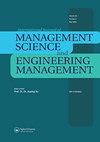考虑延误时间和成本不确定性的枢纽选址问题的新模型设计
IF 3
Q2 OPERATIONS RESEARCH & MANAGEMENT SCIENCE
International Journal of Management Science and Engineering Management
Pub Date : 2023-01-02
DOI:10.1080/17509653.2022.2089261
引用次数: 6
摘要
摘要:本文提出了一种新的枢纽选址问题模型,该模型可以评估货物延迟到达目的地的成本和时间的影响,找到不同容量的枢纽和车辆的最优数量,以及枢纽的拥塞情况。此外,本研究还从计划时间和实时性两个角度探讨了这一问题。并将问题与延误情况进行比较,通过最小化总成本、处理时间和枢纽拥堵导致的延误时间两个目标函数来解决问题。此外,还考虑了运输成本和枢纽建设的不确定性。为此,使用蒙特卡罗模拟。由于模型是非凸的和非导数的,它们是np困难的。采用粒子群优化算法对模型进行求解。这些模型在澳大利亚邮政(AP)的单次和多次分配数据上进行了测试。此外,我们还提出了一个模型,可以说明延误对结果和服务时间的影响。结果表明,多节点分配比单节点分配需要更小的枢纽和更便宜的交通工具,因为节点可以访问多个枢纽。本文章由计算机程序翻译,如有差异,请以英文原文为准。
Designing a new model for the hub location-allocation problem with considering tardiness time and cost uncertainty
ABSTRACT This paper has addressed the new model for the hub location-allocation problem that can evaluate the impact of cost and time of tardiness in delivering goods to the destination, find the optimal number of hubs and vehicles with different capacities, and congestion in hubs. In addition, this study investigates the problem from two perspectives: scheduled time and real-time. Also, it compares the problem in circumstances with tardiness and solves the problem with two objective functions by minimizing the total costs, handling time, and delay time caused by congestion in the hubs. Moreover, the uncertainty of transportation costs and hub establishment are considered. For this purpose, the Monte-Carlo simulation is used. Due to the models being non-convex and non-derivative, they are NP-hard. So, the models are solved with the particle swarm optimization (PSO) algorithm. The models are tested on Australian Post (AP) data for single and multiple allocations. Also, we presented a model that can illustrate the effect of tardiness on the results and service time. The results show multiple allocation than single ones needs the smaller hubs and cheaper vehicles for transportation due to access the nodes to several hubs.
求助全文
通过发布文献求助,成功后即可免费获取论文全文。
去求助
来源期刊

International Journal of Management Science and Engineering Management
OPERATIONS RESEARCH & MANAGEMENT SCIENCE-
CiteScore
8.50
自引率
33.30%
发文量
40
期刊介绍:
International Journal of Management Science and Engineering Management (IJMSEM) is a peer-reviewed quarterly journal that provides an international forum for researchers and practitioners of management science and engineering management. The journal focuses on identifying problems in the field, and using innovative management theories and new management methods to provide solutions. IJMSEM is committed to providing a platform for researchers and practitioners of management science and engineering management to share experiences and communicate ideas. Articles published in IJMSEM contain fresh information and approaches. They provide key information that will contribute to new scientific inquiries and improve competency, efficiency, and productivity in the field. IJMSEM focuses on the following: 1. identifying Management Science problems in engineering; 2. using management theory and methods to solve above problems innovatively and effectively; 3. developing new management theory and method to the newly emerged management issues in engineering; IJMSEM prefers papers with practical background, clear problem description, understandable physical and mathematical model, physical model with practical significance and theoretical framework, operable algorithm and successful practical applications. IJMSEM also takes into account management papers of original contributions in one or several aspects of these elements.
 求助内容:
求助内容: 应助结果提醒方式:
应助结果提醒方式:


